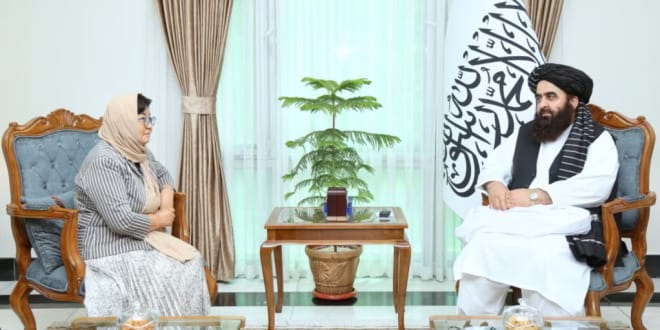10 Jun. 24: Diplomatic preparations are in full swing for the third international conference on Afghanistan, set to take place in Doha, Qatar, on June 30. Dubbed “Doha-III,” the conference aims to advance the efforts initiated by United Nations Secretary-General Antonio Guterres and special envoys on Afghanistan to devise an effective global strategy for the Taliban-governed nation, which is grappling with severe humanitarian and economic crises.
This meeting holds significant importance as it coincides with the third anniversary of the Taliban’s return to power in Afghanistan. It also follows the recent visit of Afghanistan’s acting Minister of Interior Affairs, Sirajuddin Haqqani, to the United Arab Emirates (UAE), which has sparked intense speculation about the potential recognition of the Taliban government.
Haqqani, who is wanted by the U.S. for his alleged involvement in an attack that killed an American citizen, reportedly met with key American and other Western officials in Dubai. This visit was preceded by critical discussions between Qatari ministers, UN and European Union officials, and Taliban ministers in Kabul last month to persuade them to attend the two-day Doha-III meeting.
The UN has informed Taliban leaders that it is finalizing the agenda for the crucial international conference, aiming for acceptance by all sides. Roza Otunbayeva, head of the UN Assistance Mission in Afghanistan, met Taliban Foreign Minister Amir Khan Muttaqi in Kabul to discuss the matter.
According to Muttaqi’s office, the discussions centered on the detailed outlook and necessary coordination for the June 30 meeting. “At the outset, Roza Otunbayeva said that her team is working on the agenda of the third Doha meeting and trying to arrange an agenda that could be recognized by all sides,” the Taliban Foreign Ministry stated.
Muttaqi emphasized the significance of an agenda acceptable to all sides, pledging to work closely with the concerned parties. The UN has not yet commented on its envoy’s meeting with the Taliban diplomat.
These diplomatic activities raise questions about whether the Islamic Emirate of Afghanistan will attend the Doha-III meeting and whether circumstances will force the Taliban to drop their insistence on six conditions for participation. It remains unclear if all major stakeholders, including the UN, the U.S., and the EU, have reached a consensus on engaging with the Taliban.
The Taliban’s original conditions included: (1) restoring Afghanistan’s seat at the UN to the Islamic Emirate; (2) dropping the appointment of a special representative for Afghanistan; (3) discussing the agenda and composition of the Doha-III conference with the Taliban; and (4) excluding girls’ education, women’s employment, and the formation of an inclusive government from the agenda.
Taliban leaders have repeatedly stated they have no intention of implementing reforms that contradict “Afghan traditions and norms of Islam.” Meanwhile, major powers and regional players demand serious reforms, an inclusive government, and liberalization from the Taliban. Western countries are pushing for the Taliban to adopt a more liberal and tolerant regime.
Political observers in South Asia suggest a comprehensive strategy is needed to normalize the situation in Afghanistan. This should include a willingness to engage in dialogue with Taliban factions committed to international dialogue and seeking recognition. Conservative groups and their sponsors should face pressure and incentives to transform their strategies.
The Taliban affirm their desire to establish a genuine Islamic system for Afghanistan, promising provisions for women’s and minority rights in line with cultural traditions and religious rules. With the Taliban firmly entrenched as rulers with no significant opposition, the western world needs a constructive approach to deal with them.
Activists have criticized the UN for inviting the Taliban to the Doha meeting, arguing it comes at the cost of Afghan women and girls’ rights. About a dozen rights organizations, including Human Rights Watch and Amnesty International, have written to the UN, Security Council, and member states, highlighting concerns over the exclusion of women’s rights from the agenda.
UN officials defend their engagement with the Taliban, stating they are the de facto authorities in Afghanistan and emphasizing the need to uphold the rights of women and girls. Afghan authorities have also sought high-level meetings with the UN, viewing them as beneficial.
No foreign country has recognized the Taliban as Afghanistan’s legitimate rulers since their return to power in August 2021. Taliban’s supreme leader, Hibatullah Akhundzada, has declared he governs in line with local culture and Islamic teachings, rejecting international criticism as interference.
Foreign Minister Muttaqi, after meeting UN Deputy Secretary General Rosemary Anne DiCarlo, stated the Islamic Emirate is reviewing the Doha-III framework before announcing its stance. Muttaqi expressed hope for positive outcomes from the conference.
Amid the diplomatic efforts, Western stakeholders are concerned over Russia’s consideration of removing the Taliban from its terror list, which could strengthen Kabul-Moscow ties. The EU also appears keen to engage the Taliban without formally recognizing them.
There is a growing desire to assist Afghanistan’s impoverished population, acknowledging the Taliban’s firm hold on power. Economic development and international trade hinge on easing sanctions on the regime.
The Taliban realize international engagement is essential, and Kabul must consider global aspirations to ease trade and financial restrictions. The Doha-III conference aims to find a middle ground for stakeholders, fostering survival and hope for Afghanistan’s people as the third anniversary of the Taliban’s return to power approaches.




